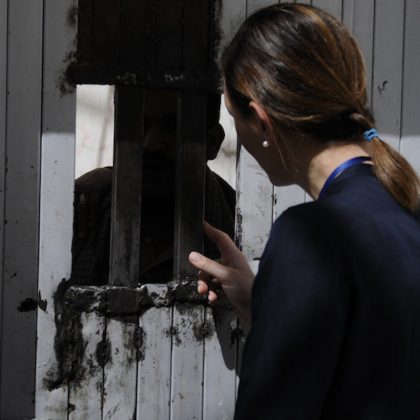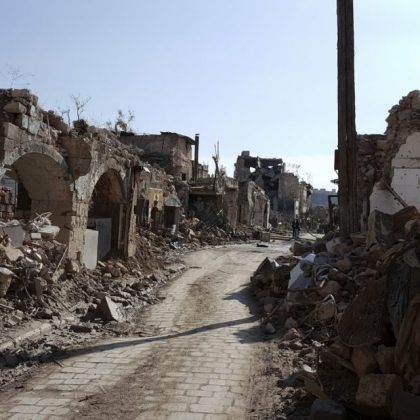Counter Terrorism, International Humanitarian Law and an Opportunity for India to Promote Congruence
In a first since its establishment in 2001, a special meeting of the UN Security Council’s Counter Terrorism Committee (UNSC-CTC) has been hosted in India. India is also set to preside over the Open Briefing on ‘Global counter terrorism architecture: Principles and the way ahead’ as part of its UNSC Presidency in December. As she prepares herself to lead the discussion on counter terrorism at the international level, India must be mindful of the challenges that counter terrorism law may pose to other regimes, in particular to international humanitarian law (IHL), and support an approach that promotes congruence.
The Applicability of IHL to Counter Terrorism Contexts
Though the legal regime of counter terrorism comprises overlapping bodies of legal norms, this piece is concerned particularly with its overlap with the regime of IHL. This could happen in situations of armed violence between a State and a non-State armed group designated as “terrorist”, “where the violence is of sufficient intensity and the group sufficiently organized” (Saul). If these criteria of intensity and organization are met, such armed violence would meet the threshold of a non-international armed conflict (NIAC) under IHL, thereby, making the rules of IHL applicable. Though States deny that non-State armed groups designated as “terrorist” could be party to a NIAC, “the trend is progressively reversing, with stakeholders accepting that IHL is relevant for their counter terrorism activities” (ICRC).
However, tensions might arise when the two regimes overlap. This is because, while counter terrorism norms attempt to curtail material support to terrorist organizations, IHL does not preclude engagement with these groups.
Counter Terrorism Norms and their Impact on IHL
Counter terrorism norms proscribe any form of support to terrorists and terrorist organizations. This seemingly reasonable requirement may, however, have an adverse impact on IHL. This is because of the way the term “support” can be interpreted, coupled with the absence of “humanitarian exemptions” in counter terrorism laws.
The interpretation of the term ‘support’
Though States must ensure that persons supporting terrorist acts are brought to justice, a broad interpretation of the term “support” can result in certain humanitarian actions being construed as supporting terrorist acts or groups. The interpretation given to the term by the Supreme Court of the United States in Holder v Humanitarian Law Project is an example of this. The forms of support considered in this case were training, expert advice or assistance, and the provision of services or personnel. The plaintiffs wanted “to train members of the PKK on how to use humanitarian and international law to peacefully resolve disputes and teach them how to petition various representative bodies such as the United Nations for relief”. They also wanted “to engage in political advocacy on behalf of Kurds living in Turkey and Tamils living in Sri Lanka” but were concerned that such advocacy might be regarded as material support in the form of providing personnel or services. The Court came to the conclusion that the activities in which the plaintiffs wanted to engage easily fell within the scope of the terms “training” and “expert advice or assistance”, and amounted to providing material support to terrorist organizations, and hence, were rightly prohibited by the government.
IHL, however, foresees engagement with these groups to promote compliance with its rules. Moreover, IHL requires that the wounded and sick be collected and cared for, medical personnel be protected and granted all available help for the performance of their duties and that no person be punished for having carried out medical activities compatible with medical ethics, regardless of the person benefitting therefrom.
A broad interpretation of the term support, such as the one in Holder, that includes within its ambit activities such as training members of a group about the relevant rules of IHL, could have an adverse impact on the effectiveness of IHL. Interpreted in this manner, “support” could even include medical assistance by humanitarian actors if the beneficiaries of such assistance are members of a terrorist group. It can give rise to a concern among humanitarian actors that their actions could fall foul of counter terrorism laws. Organizations involved in such work and their staff may face liability under the counter terrorism laws of different States. Counter terrorism law, and in particular, a broad interpretation of the term support, can, therefore, have a chilling effect on various actions allowed under the regime of IHL.
The absence of humanitarian exemptions
A related issue that makes matters worse is the absence of humanitarian exemptions (an exemption that clarifies that humanitarian action must not be understood as support to terrorist organizations) in the counter terrorism laws of States. Although Security Council Resolution 1373, adopted in the aftermath of the September 11 attacks, required States to ensure that persons who participate in supporting terrorist acts are brought to justice, it did not require them to provide humanitarian exemptions in their national provisions. It was left to the choice of individual States. However, as States have adopted a blanket approach to counter terrorism legislation, it is difficult to find such exemptions in national provisions. The absence of provisions expressly including humanitarian exemptions adds to the apprehension that even actions permitted under the regime of IHL can be construed as providing support to terrorist groups, making humanitarian actors liable for the same.
Developments Supporting Congruence that India must Consider
It is clear that counter terrorism law can pose challenges for IHL. Nevertheless, there is increasing recognition that counter terrorism measures taken by States must fully comply with their obligations under international law, and in particular, under IHL. India’s approach to counter terrorism must be similar, whereby, she encourages compliance with other obligations while undertaking such measures.
Certain developments that are of particular significance in this regard are General Assembly Resolution 72/284 and Security Council Resolution 2482. The former recognizes that any measures taken by Member States to prevent and combat terrorism must fully comply with their obligations under relevant international conventions and protocols, particularly IHL, and urges States to ensure that counter terrorism legislation and measures do not impede humanitarian and medical activities or engagement with all relevant actors as foreseen by IHL. Similarly, Resolution 2482 requires Member States to ensure that any measures taken to counter terrorism must comply with all their obligations under IHL, and also urges States to take into account the potential effects of counter terrorism measures on exclusively humanitarian activities, that are carried out by impartial humanitarian actors in a manner consistent with IHL. The report of the Special Rapporteur to the UN Human Rights Council emphasizing that humanitarian exemptions are critical in protecting civil society actors from counter terrorism measures and supporting the view that States should unambiguously exempt humanitarian actions from their counter terrorism measures, is also of significance.
India’s Unlawful Activities (Prevention) Act
India must reconsider its own counter terrorism legislation, the Unlawful Activities (Prevention) Act, 1967. The provisions of this law as well as its application have stirred controversy on many occasions. For the purpose of this discussion, however, our focus is limited to the potential effect of the provisions of the UAPA on IHL. Section 39 of the Act titled offence relating to ‘support’ given to a terrorist organization provides that a person commits the offence relating to support if he “invites support for the terrorist organization, or arranges, manages or assists in arranging or managing a meeting which he knows is to support the terrorist organization or if he addresses a meeting for the purpose of encouraging support for the terrorist organization or to further its activity”. However, the provision does not define the contours of the term “support”, nor does it include any “exemption” clarifying that humanitarian action is not to be understood as support to terrorist organizations.
The Supreme Court of India had an opportunity to explain the term “support” under section 39 of the Act in Thwaha Fasal v Union of India. It noted that even if an accused allegedly supports a terrorist organisation by committing acts referred in the section, s/he can only be held guilty if those acts “are done with intention to further the activities of a terrorist organisation” (para 13). However, the Court didn’t define the term “support”. In the absence of clarity on what the term support could include or exclude, even training members about IHL or providing medical assistance to them could be seen as furthering the activities of a terrorist organization. The decision, therefore, falls short of providing a respite for humanitarian action.
Nevertheless, defining the term support is not without its challenges. In the absence of consensus on the legal definitions of “terrorist” and “terrorism”, it is difficult to define acts that would constitute “support” to terrorists and terrorist organizations. A better way of achieving congruence with IHL would be to add a humanitarian exemption in the UAPA, which unambiguously excludes humanitarian actions from being considered as “support” to terrorist organizations or their activities.
Conclusion
India has an opportunity to lead by example in ensuring that its counter terrorism law is in congruence with the rules of IHL. As she prepares to lead the discussion on the global counter terrorism architecture and principles, she must encourage compliance with the regime of IHL when there is an overlap with counter terrorism laws.

Antarnihita Mishra is Assistant Professor of Law at IFIM Law School, Bengaluru, India. She has an LL.M. in International Law from South Asian University, New Delhi.
Read more on this topic in the Asian Journal of International Law.






